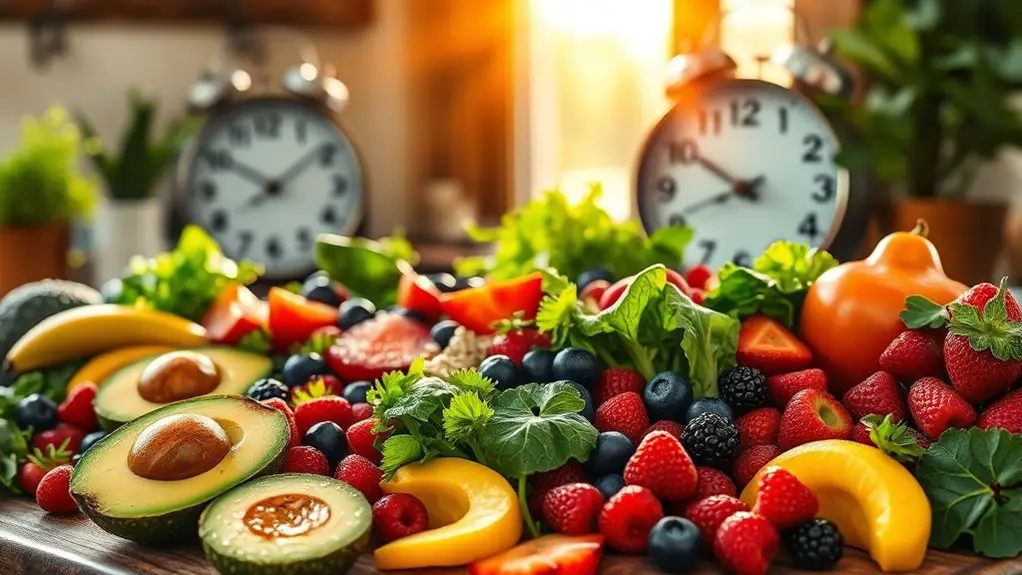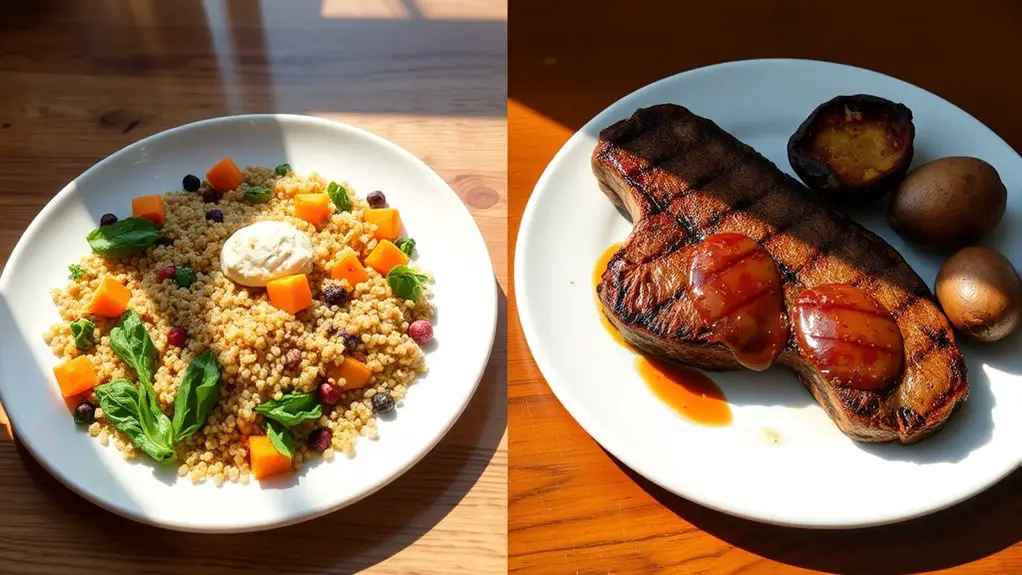Plant-based diets, like vegan, vegetarian, and flexitarian, are great for high-performance athletes looking to boost energy and recovery. Vegan diets focus on nutrient density and whole foods, while vegetarian approaches guarantee balance and include dairy. Flexitarian diets offer a mix, allowing occasional animal products. Key nutrients from legumes, leafy greens, and healthy fats support your performance. If you're curious about how to optimize meal planning and learn from successful athletes, there's more to explore.
Understanding Plant-Based Nutrition for Athletes
Understanding plant-based nutrition for athletes is essential for optimizing performance and recovery. You might think that cutting out animal products limits your options, but it actually opens up a world of vibrant, nutrient-dense foods. Focusing on whole grains, legumes, fruits, and vegetables can provide you with the energy and nutrients needed for peak performance.
It's about fueling your body with what it craves. Lean on sources of protein like chickpeas, lentils, and quinoa to build and repair muscles. Don't forget healthy fats from nuts and seeds to support overall health and inflammation reduction.
Embracing this lifestyle means exploring diverse flavors and dishes, empowering you to take control of your nutrition. Staying hydrated is essential for optimal performance and ensuring you have enough fluids can greatly enhance your stamina, boost recovery times, and keep you feeling light and agile. With the right approach, you can thrive in your athletic endeavors, all while enjoying the freedom of plant-based living.
Vegan Diets: Fueling Performance With Plants
When it comes to vegan diets, focusing on nutrient density is key to maximizing your performance. You'll want to plan your meals strategically to guarantee you're getting all the essential vitamins and minerals. Additionally, meal timing plays a crucial role in fueling your workouts with the power of plants.
Nutrient Density Essentials
Nutrient density is key for athletes looking to optimize performance, especially on a vegan diet. You want to fuel your body with foods that pack a punch in vitamins, minerals, and antioxidants. Focus on whole, unprocessed foods like leafy greens, legumes, nuts, seeds, and whole grains. These choices not only provide essential nutrients but also support recovery and energy levels.
Don't shy away from colorful fruits and vegetables—they're rich in phytonutrients that can enhance your overall health. Incorporate a variety of foods to guarantee you're meeting your nutritional needs without feeling restricted. By embracing nutrient-dense options, you'll empower your body and mind, allowing you the freedom to perform at your best while enjoying the vibrant flavors of plant-based eating.
Meal Planning Strategies
To maximize the benefits of a plant-based diet, effective meal planning is essential for athletes. Start by prepping meals in advance; this gives you the freedom to grab nutritious options on the go. Focus on diverse foods—think legumes, grains, nuts, and plenty of colorful veggies. Create a weekly menu that balances protein, carbs, and healthy fats to fuel your workouts and recovery. Don't forget to experiment with flavors and spices to keep your meals exciting. Batch cooking can save time and guarantee you always have healthy choices available. Finally, listen to your body; adjust portion sizes and ingredients based on your energy levels and performance needs. With a solid plan, you'll thrive on your plant-based journey!
Vegetarian Diets: A Balanced Approach to Athletic Nutrition
When considering a vegetarian diet for athletic performance, it's essential to maintain nutritional balance. You'll want to focus on diverse protein sources to guarantee you're meeting your energy and recovery needs. A well-rounded vegetarian diet can provide most nutrients with careful planning to ensure you're fueling your body effectively. Let's explore how this balanced approach can optimize your training and overall health.
Nutritional Balance Essentials
While many athletes might believe that a vegetarian diet lacks the necessary components for peak performance, a well-planned vegetarian approach can provide a balanced array of nutrients essential for athletic success. You'll want to focus on a variety of whole foods, including fruits, vegetables, whole grains, legumes, nuts, and seeds. This diverse intake guarantees you get vitamins, minerals, healthy fats, and complex carbohydrates. Don't forget to pay attention to iron and calcium sources, as these are vital for energy and bone health. Embracing this lifestyle allows you to fuel your body effectively while enjoying the freedom to explore delicious, plant-based meals. With the right planning, you can thrive on a vegetarian diet and achieve your athletic goals.
Protein Sources for Athletes
A well-rounded vegetarian diet can provide all the protein an athlete needs to support muscle recovery and growth. You don't have to sacrifice performance for plant-based living. Focus on diverse sources like legumes, lentils, chickpeas, and quinoa—they're packed with protein and essential amino acids. Nuts and seeds also offer healthy fats and extra protein, while tofu and tempeh serve as excellent meat substitutes, delivering a solid protein punch. Incorporating whole grains can further boost your intake. Don't forget about plant-based protein powders, which can be a convenient addition to smoothies or post-workout shakes. With creativity and variety, you can meet your protein needs while enjoying the freedom of a vegetarian lifestyle. Embrace the power of plants!
Flexitarian Diets: The Best of Both Worlds
Flexitarian diets offer a flexible approach to eating that combines the benefits of plant-based foods with the occasional inclusion of meat and animal products. This gives you the freedom to nourish your body without feeling restricted. You can enjoy vibrant fruits, veggies, grains, and legumes as your mainstay, while still savoring a juicy steak or fresh fish when the craving strikes.
For high-performance athletes, this balance is key. You can reap the rewards of a plant-based diet, such as improved recovery and energy, without completely giving up the flavors or nutrients from animal sources. It's all about listening to your body and choosing what feels best for you. Incorporating adequate protein intake is essential for supporting muscle repair and growth during recovery.
Key Nutrients for High-Performance on a Plant-Based Diet
Eating a mix of plant-based foods and occasional animal products can set a solid foundation for your training, but to really excel, you need to focus on specific nutrients that support high performance. First up, protein is vital—aim for legumes, nuts, and seeds to help with muscle repair. Don't forget about iron; you can find it in spinach and lentils to keep your energy levels high. Omega-3 fatty acids, often found in flaxseeds and chia seeds, are essential for heart health and reducing inflammation. Also, make sure you're getting enough calcium from fortified plant milks or leafy greens for strong bones. Finally, Vitamin B12 is key for energy production—if you're not consuming animal products, consider a supplement. By paying attention to these nutrients, you'll be well on your way to releasing your full potential in your athletic pursuits. Additionally, incorporating healthy fats into your diet can further enhance recovery and performance.
Meal Planning for Optimal Athletic Performance
When you're aiming for ideal athletic performance, meal planning becomes essential, especially on a plant-based diet. You want to fuel your body with the right nutrients to enhance endurance, strength, and recovery. Here's a simple table to help you plan your meals effectively:
| Meal | Protein Source | Carbohydrate Source |
|---|---|---|
| Breakfast | Tofu scramble | Oatmeal |
| Lunch | Lentil salad | Quinoa |
| Dinner | Chickpea curry | Brown rice |
Incorporating a variety of foods will guarantee you're meeting your nutritional needs while keeping meals exciting. Think about prepping meals in advance to minimize stress on busy days. Remember, flexibility is key—allow yourself to try new recipes and adjust portions based on your activity level. With thoughtful meal planning, you'll set yourself up for success and feel free to pursue your athletic goals with energy and enthusiasm.
Success Stories: Athletes Thriving on Plant-Based Diets
Many athletes have found success and improved performance by adopting a plant-based diet, demonstrating that ideal nutrition can come from plant sources. Take, for instance, ultra-endurance runner Scott Jurek, who's thrived on a vegan diet, smashing records while fueling his body with whole foods. Then there's tennis champion Venus Williams, who embraced plant-based eating to manage her autoimmune condition, ultimately enhancing her performance on the court.
You might be inspired by these stories, realizing that a plant-based diet can offer you freedom from heavy, sluggish meals while providing the energy you need. Imagine feeling lighter and more agile, all while nourishing your body with vibrant fruits, vegetables, and whole grains.
As you explore this lifestyle, remember that many athletes have discovered their peak potential through plant-based nutrition. You can unleash your own success, fueling your passion for performance with nature's finest offerings.
Frequently Asked Questions
Can Plant-Based Diets Support Muscle Gain for Athletes?
Just like a sturdy tree thrives in rich soil, you can flourish on a plant-based diet. With the right nutrients and dedication, you'll not only build muscle but also embrace your athletic freedom.
How Do I Transition to a Plant-Based Diet Safely?
To shift safely, start by gradually replacing animal products with plant-based alternatives. Focus on whole foods, guarantee you're getting enough protein, and listen to your body's needs. It's all about balance and enjoying the journey.
What Supplements Are Recommended for Plant-Based Athletes?
While some think plant-based diets lack nutrients, you can thrive with the right supplements. Consider vitamin B12, omega-3s, and protein powders to guarantee you're fueling your body for ideal performance and recovery.
Are There Specific Foods to Avoid on a Plant-Based Diet?
Yes, you should avoid highly processed foods, excessive sugars, and unhealthy fats. Stick to whole foods for ideal nutrition. It's all about fueling your body right while enjoying the freedom that a plant-based diet offers!
How Can I Ensure Adequate Protein Intake on a Plant-Based Diet?
To guarantee adequate protein intake on a plant-based diet, focus on diverse sources like beans, lentils, quinoa, nuts, and seeds. You'll feel more empowered knowing you're fueling your body with nutritious, plant-based options!




